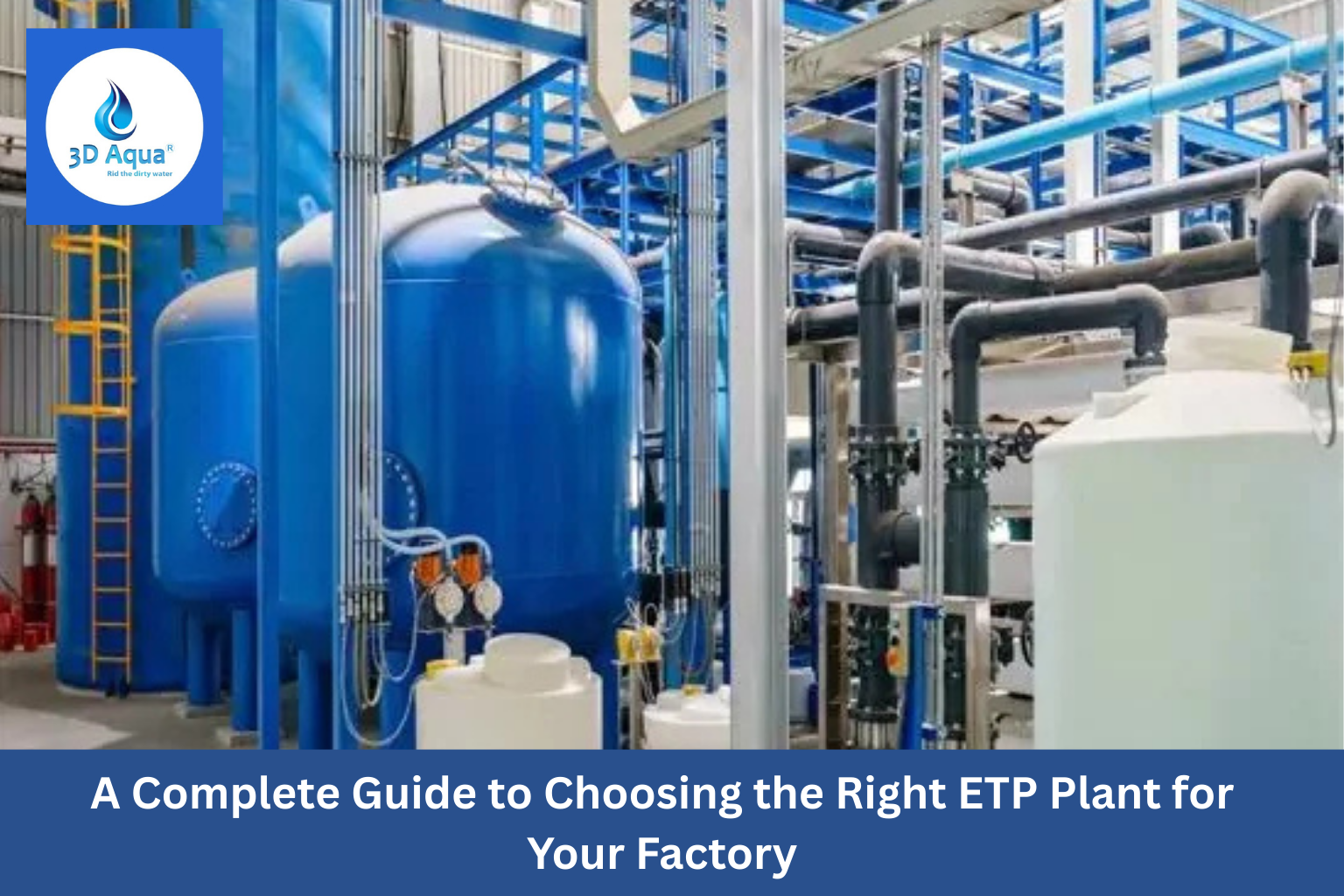In today’s competitive industrial landscape, maintaining compliance with environmental regulations is just as important as maximizing production efficiency. One of the most essential components in achieving this balance is an Effluent Treatment Plants (ETPs). Whether you run a small manufacturing unit or a large industrial facility, choosing the right ETP plant ensures safe effluent disposal, reduced pollution, and long-term operational sustainability.
At 3DAqua (www.3daqua.in), we provide customized, industry-specific ETP solutions designed to meet pollution control standards and help industries operate responsibly. This guide will help you understand how to select the perfect ETP plant for your factory.
1. Understand the Nature of Your Effluent
Different industries generate different types of wastewater. Before selecting an ETP plant, it’s important to analyze the characteristics of your effluent.
Key parameters to identify:
- pH level
- Chemical Oxygen Demand (COD)
- Biological Oxygen Demand (BOD)
- Total Suspended Solids (TSS)
- Heavy metals or toxic chemicals
- Oil and grease concentration
Industries that require specialized ETPs:
- Textile & dyeing units
- Electroplating & metal finishing
- Pharmaceutical & chemical factories
- Food processing units
- Automobile & engineering industries
- Paper mills
- Oil & refinery plants
At 3DAqua, we perform a complete effluent study to determine the exact treatment method your industry requires. Learn more: https://www.3daqua.in
2. Choose the Right Treatment Technology
The choice of technology depends entirely on the effluent composition. Common ETP technologies include:
✔ Primary Treatment
- Screening
- Sedimentation
- Oil & grease trap
Purpose: Removes solids and floating impurities.
✔ Secondary (Biological) Treatment
- MBBR (Moving Bed Bio Reactor)
- SBR (Sequential Batch Reactor)
- Activated Sludge Process (ASP)
Purpose: Treats biodegradable organic matter.
✔ Tertiary & Advanced Treatment
- UF & RO systems
- Activated carbon filtration
- Ozonation
- Chlorination
Purpose: Needed for industries with high toxicity or for achieving zero liquid discharge (ZLD).
3DAqua designs hybrid ETP systems combining multiple technologies for maximum efficiency and compliance. Check our ETP solutions: https://3daqua.in/products
3. Ensure Compliance With Pollution Control Standards
Every state pollution control board (SPCB) has strict guidelines for industrial wastewater discharge.
Your ETP must meet:
- CPCB / SPCB effluent norms
- Zero Liquid Discharge (ZLD) requirements (where applicable)
- Industry-specific discharge standards
A compliant ETP protects your factory from:
- Heavy penalties
- Legal actions
- Operational shutdowns
3DAqua ensures full compliance through certified ETP designs and high-standard components: https://www.3daqua.in
4. Consider Space, Layout & Flow Rate
ETP design depends on:
- Available installation space
- Daily effluent generation (KLD)
- Peak load fluctuations
- Existing pipeline layout
Whether you need a compact ETP, above-ground or underground installation, or modular skid-mounted units, 3DAqua provides tailor-made solutions to match your site conditions. Learn more: https://3daqua.in/products
5. Evaluate Operating & Maintenance Costs
A cost-effective ETP is about long-term operation as much as initial investment.
Factors affecting O&M cost:
- Electricity consumption
- Chemical dosing requirements
- Manpower needs
- Sludge handling and disposal
- Component durability
Modern technologies like MBBR and SBR reduce energy and maintenance costs. We focus on low O&M designs with automated control systems. Details: https://www.3daqua.in
6. Look for Automation & Smart Monitoring
Advanced ETPs feature:
- PLC/SCADA automation
- Online pH/COD/BOD monitoring
- Remote system alerts
- Auto dosing and auto backwash
Automation improves performance, reduces operator dependency, and ensures consistent results.
3DAqua provides smart automation options: https://3daqua.in/products
7. Check Build Quality & Material Selection
A durable ETP requires high-quality materials based on effluent type:
- RCC or mild steel tanks
- FRP/PP tanks for chemical-rich wastewater
- High-grade pumps and blowers
- Corrosion-resistant piping
Quality construction ensures long life and stable performance. Learn more: https://www.3daqua.in
8. Choose a Reliable ETP Manufacturer
The success of your ETP depends heavily on the manufacturer’s expertise.
Why industries choose 3DAqua:
- Customized ETP designs
- Industry-specific solutions
- End-to-end services: design → supply → installation → commissioning
- AMC & maintenance support
- Skilled technical team
- Proven track record across India
We don’t just install ETPs—we ensure they perform flawlessly for years. Visit: https://www.3daqua.in/clients
Why Selecting the Right ETP Matters
A well-designed ETP helps your factory achieve:
- Environmental compliance
- Reduced pollution footprint
- Lower operating costs
- Recycling & reuse of treated water
- Improved sustainability and reputation
Contact 3DAqua Today – ETP Solutions
Looking for a reliable Effluent Treatment Plant (ETP) manufacturer in India? Partner with 3DAqua, your trusted expert for industrial and commercial wastewater treatment solutions.
📍 Manufacturing Units:
- Okhla Industrial Area, Delhi
- Sector 10, Noida, Uttar Pradesh
📞 Call Us: 0120-415 3030 | 70111 43366 | 626262 9090
🕑 24/7 Helpline: +91 89630 89630
📧 Email: info@3daqua.in
🌐 Website: www.3daqua.in
🔗 Client List: https://3daqua.in/clients
📂 Explore Products: https://3daqua.in/products
Conclusion
Choosing the right ETP plant for your factory is a critical decision that impacts both compliance and operational efficiency. By analyzing effluent characteristics, selecting suitable technology, and partnering with an experienced provider like 3DAqua, you can ensure safe, reliable, and cost-effective treatment of industrial wastewater.
Whether you need a new ETP plant, an upgrade, or troubleshooting support, 3DAqua.in provides complete solutions tailored to your industry.
Visit: https://www.3daqua.in

